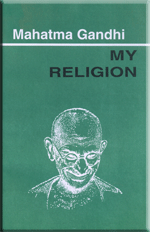
P.O. SEVAGRAM, DIST.WARDHA 442102, MS, INDIA. Phone: 91-7152-284753
FOUNDED BY MAHATMA GANDHI IN 1936
My Religion

MY RELIGION
Written by : M. K. Gandhi
Table of Contents
Section-1:WHAT I MEAN BY RELIGION
Section-2:
THE SOURCES OF MY RELIGION
Section-3:
I RESPECT ALL RELIGIONS
- All Religions Lead To God
- My Attitude To The Scriptures of Other Religions
- One's Own Religion
- Christianity
- Buddhism
- Islam
- Theosophy
- Spiritualism
- Superiority and Inferiority of Religions
- Conversion
- The Better Way
MY FAITH IN GOD
Section-5:
MY RELIGION IN PRACTICE
- Religion of Love
- Love Expressing Itself in Self-sacrificing Service
- Love In Opposition To Wrong
- Love In Relating to The Animal World
AIDS TO THE PRACTICE OF MY RELIGION
Section-7:
THE GOALS OF MY RELIGION
- Religion To Pervade All Spheres of Life
- In The Social Sphere
- In The Economic Sphere
- In The Political Sphere
MY HINDUISM
- Renunciation and Dedication Its Essence
- Temple and Idol-worship
- Incarnation
- Varna and Caste
- Untouchability
- Cow Protection
- What I Value In Hinduism
About This Book
Written by : M. K. Gandhi
Compiled and Edited by : Bharatan Kumarappa
First Edition :December 1955
I.S.B.N :81-7229-169-8
Printed and Published by :Jitendra T. Desai,
Navajivan Mudranalaya,
Ahemadabad-380014
India.
© Navajivan Trust, 1968
Download
Chapter 3: At Home
My father was a lover of his clan, truthful, brave and generous, but short-tempered.
Of religious training he had very little, but he had that kind of religious culture which frequent visits to temples and listening to religious discourses make available to many Hindus. In his last days he began reading the Gita at the instance of a learned Brahmana
friend of the family, and he used to repeat aloud some verses every day at the
time of worship.
The outstanding impression my mother has left on my memory is that of saintliness. She was deeply
religious. She would not think of taking her meals without her daily prayers.
Going to Haveli—the Vaishnava temple—was one of her daily duties. As far
as my memory can go back, I do not remember her having ever missed the
Chaturmas.1 She would take the hardest vows and keep them without
flinching. Illness was no excuse for relaxing them. I can recall her once
falling ill when she was observing the Chandrayana2 vow, but the illness was not allowed to interrupt the observance. To keep two or three
consecutive fasts was nothing to her. Living on one meal a day during
Chaturmas was a habit with her. Not content with that she fasted every
alternate day during one Chaturmas. During another Chaturmas she
vowed not to have food without seeing the sun. We children on those days would
stand, staring at the sky, waiting to announce the appearance of the sua to our
mother. Everyone knows that at the height of the rainy season the sun often does
not condescend to show his face. And I remember days when, at his sudden
appearance, we would rush and announce it to her. She would run out to see with
her own eyes, but by that time the fugitive sun would be gone, thus depriving
her of her meal. "That does not matter," she would say cheerfully, "God did not
want me to eat today." And then she would return to her round of duties.
Autobiography, 1948, pp. 12-13
- Lit. a period of four months. A vow of fasting and semi-fasting during the four months of the rains. The period is a sort of long Lent.
- A sort of fast in which the daily quantity of food is increased or diminished according as the moon waxes or wanes.